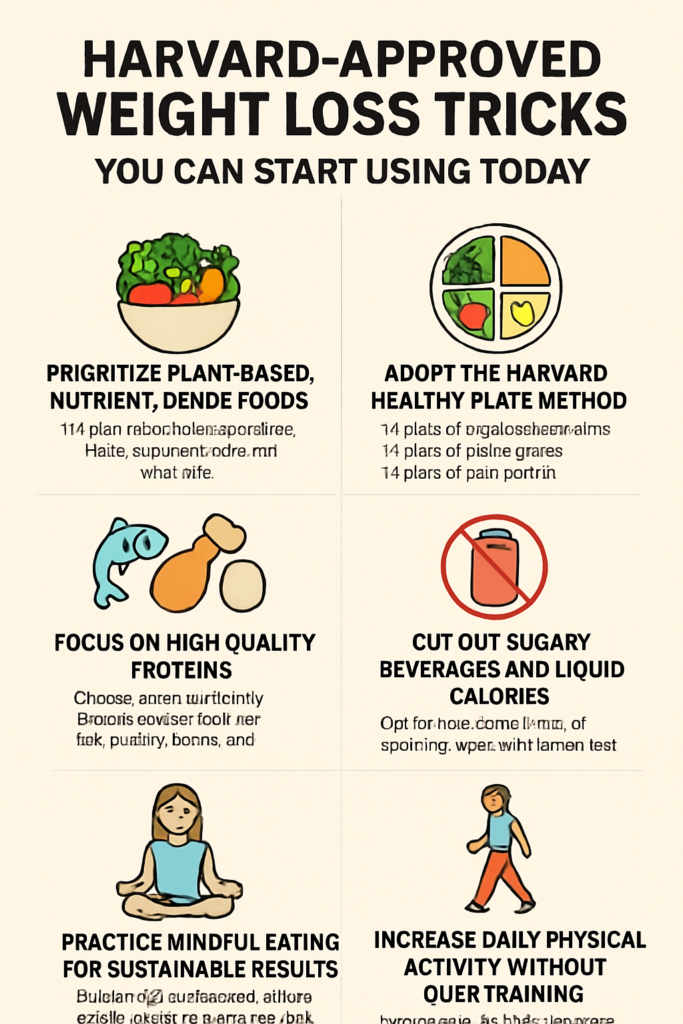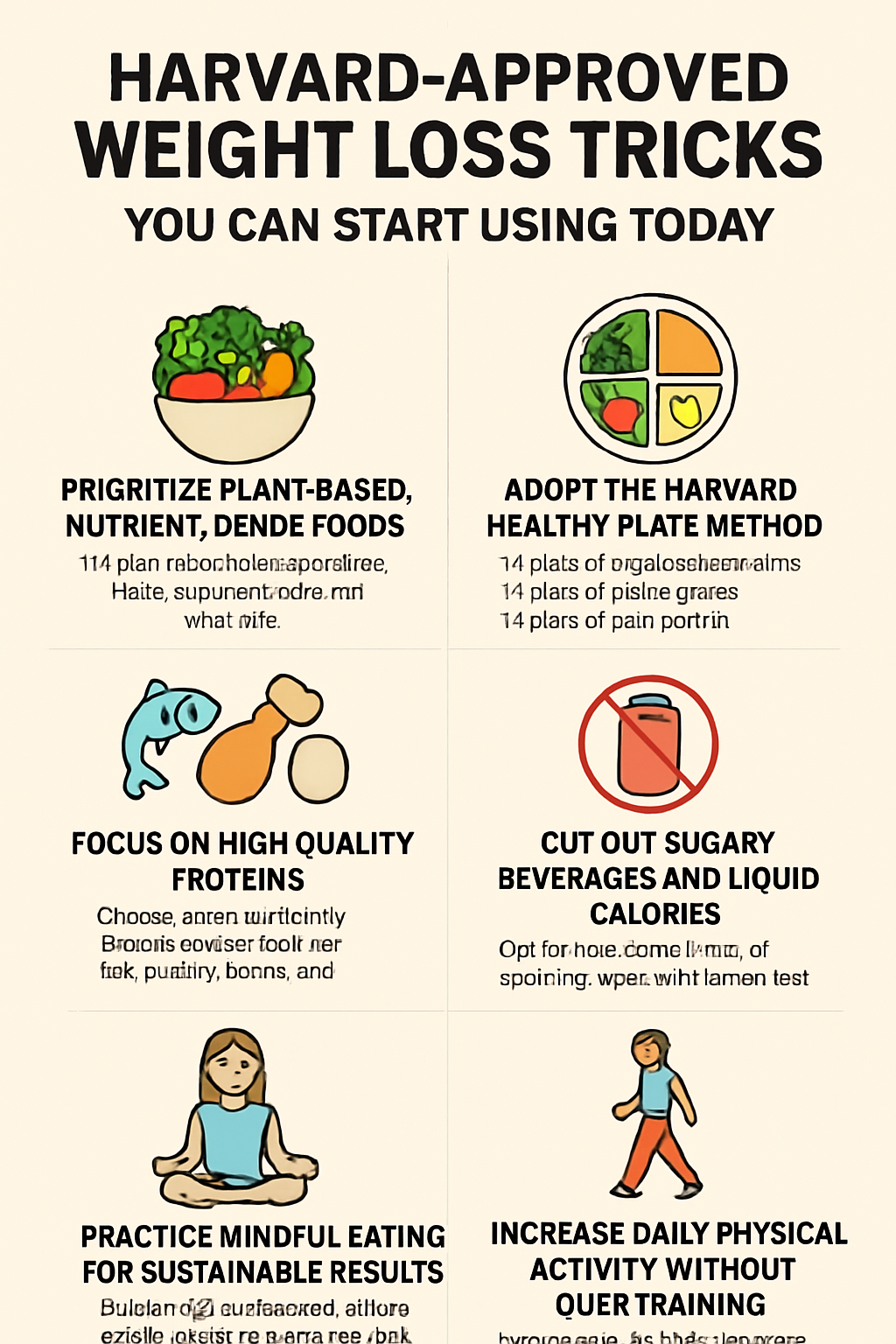
Losing weight effectively requires more than fad diets or unsustainable workout routines. According to Harvard-backed research on weight management, sustainable changes in lifestyle, eating habits, and mindset play a critical role. These strategies are not only practical but scientifically validated, ensuring long-term health benefits beyond just shedding pounds.
Prioritize Plant-Based, Nutrient-Dense Foods
One of the most consistent findings in Harvard nutrition studies for weight loss is that people who consume whole, plant-based diets tend to lose more weight and maintain it better. Filling your plate with vegetables, fruits, legumes, whole grains, and nuts helps reduce calorie intake without sacrificing satiety.
High-fiber foods slow digestion, stabilize blood sugar, and naturally reduce cravings. Incorporating options like oats, beans, quinoa, and leafy greens ensures you stay fuller for longer, making it easier to avoid overeating.
Adopt the Harvard Healthy Plate Method
Instead of obsessing over calorie counts, use the Harvard Healthy Plate model for weight loss:
- ½ plate of vegetables and fruits
- ¼ plate of whole grains
- ¼ plate of lean protein
This simple visual guide creates a balanced, portion-controlled meal that promotes fat loss while delivering essential nutrients. By emphasizing plant foods and lean proteins, it minimizes hidden calories and keeps your metabolism running efficiently.
Focus on High-Quality Proteins
Protein plays a vital role in preserving lean muscle mass while losing fat. Harvard researchers emphasize choosing lean, high-quality protein sources such as fish, poultry, beans, and tofu instead of processed or red meats. Protein not only builds muscle but also boosts satiety and increases thermogenesis, meaning your body burns more calories just by digesting it.
For breakfast, try a Greek yogurt parfait with berries and nuts or scrambled eggs with spinach—both deliver sustained energy while curbing hunger spikes.
Cut Out Sugary Beverages and Liquid Calories
Sugary drinks are among the biggest hidden contributors to weight gain, according to Harvard’s School of Public Health. Beverages like soda, energy drinks, and even fruit juices pack high amounts of sugar that rapidly spike blood glucose and insulin, promoting fat storage.
Replacing them with water, green tea, or sparkling water with lemon not only eliminates empty calories but also enhances hydration, improving metabolism and digestion help you in weight loss.
Practice Mindful Eating for Sustainable Results
Research shows that mindful eating habits significantly reduce overeating and emotional snackingleads to weight loss. Harvard experts recommend:
- Eating without distractions like TV or phones
- Chewing slowly and savoring flavors
- Stopping when 80% full instead of stuffed
Mindful eating re-trains the brain to respond to true hunger signals, preventing unnecessary calorie intake and helping with portion control.
Increase Daily Physical Activity Without Overtraining
Harvard studies highlight that consistent movement throughout the day is more impactful than sporadic high-intensity workouts. Activities like walking, cycling, swimming, or even taking the stairs contribute to steady calorie burn.
Incorporating at least 30 minutes of moderate activity five times a week can help maintain a healthy weight. Strength training should also be added 2–3 times weekly to build muscle, which naturally boosts metabolism.
Prioritize Sleep and Stress Management
Lack of sleep and chronic stress directly affect weight regulation. Harvard medical research links poor sleep to higher levels of ghrelin (hunger hormone) and reduced leptin (satiety hormone), making it harder to control appetite.
Aim for 7–9 hours of quality sleep per night and manage stress through meditation, yoga, or deep breathing. Balanced sleep and stress levels help the body regulate hormones that influence fat storage and cravings.
Avoid Ultra-Processed Foods
Ultra-processed foods—such as chips, frozen meals, and packaged snacks—are high in refined carbs, unhealthy fats, and artificial additives. Harvard experts stress that these foods disrupt gut health, increase inflammation, and promote weight gain.
Choosing whole, minimally processed options ensures your body receives nutrients in their natural form, improving digestion and metabolism efficiency.
Establish Consistency With Small Lifestyle Shifts
The key to long-term success is not drastic restriction but gradual, consistent changes. Simple adjustments like eating dinner earlier, walking after meals, or replacing refined carbs with whole grains accumulate into sustainable results. Harvard-approved strategies emphasize habit formation, ensuring that weight loss is permanent and not just temporary.
Final Thoughts
These Harvard-approved weight loss tricks are not quick fixes but science-based methods for building a healthier lifestyle. By emphasizing nutrient-rich foods, mindful eating, regular activity, proper sleep, and stress balance, you create a framework for both immediate fat loss and long-term weight management.
Adopt these strategies today, and you’ll not only lose weight but also enhance your overall health, energy, and longevity.
